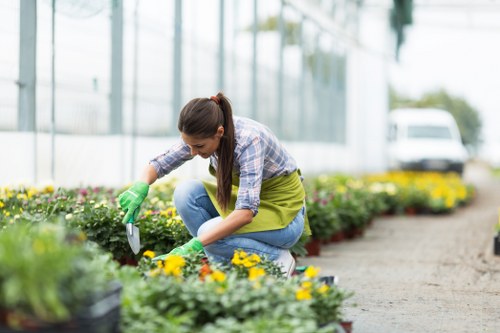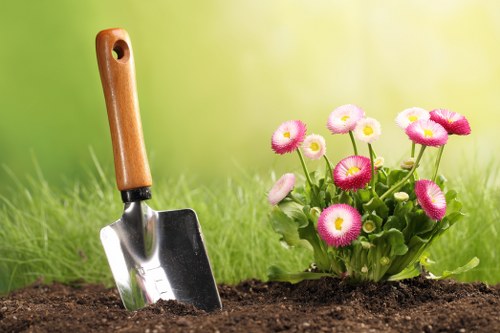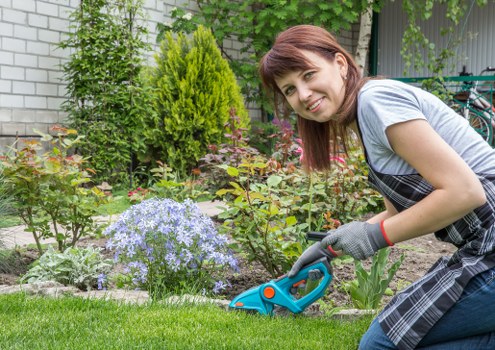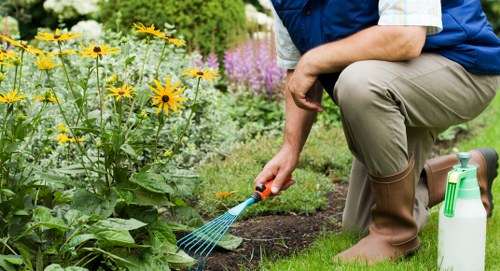Comprehensive Guide to Garden Maintenance in Stockwell

Introduction to Garden Maintenance
Maintaining a beautiful garden requires dedication, knowledge, and the right techniques. In Stockwell, garden maintenance is essential not only for aesthetic appeal but also for the health and longevity of your plants. Whether you’re a seasoned gardener or a beginner, understanding the fundamentals of garden upkeep can transform your outdoor space into a vibrant haven.
Garden maintenance encompasses a variety of tasks, including pruning, weeding, soil preparation, and pest control. Each of these activities plays a pivotal role in ensuring your garden thrives throughout the year. In this article, we will delve into effective garden maintenance strategies tailored specifically for Stockwell’s unique climate and soil conditions.
By implementing these practices, you can achieve a lush, flourishing garden that enhances the beauty of your home and provides a serene environment for relaxation and enjoyment.

Seasonal Garden Maintenance
Spring Maintenance
Spring is a crucial time for garden maintenance in Stockwell. As the weather warms up, it’s the perfect opportunity to prepare your garden for the growing season. Start by cleaning up any debris left from the winter months, such as fallen leaves and dead plant material. This not only improves the appearance of your garden but also prevents the spread of diseases.
Next, focus on soil preparation. Stockwell’s soil can benefit from the addition of organic matter like compost or manure. This enriches the soil, providing essential nutrients that promote healthy plant growth. Aerating the soil can also improve drainage and root development, ensuring your plants have the optimal conditions to thrive.
Planting new flowers, shrubs, and trees in the spring can give them a head start before the intense heat of summer sets in. Be sure to choose species that are well-suited to Stockwell’s climate to ensure they adapt and flourish in your garden.

Summer Maintenance
During the summer months, garden maintenance shifts towards ensuring plants are well-watered and protected from pests. Regular watering is crucial, especially for newly planted species. Early morning or late evening irrigation is recommended to minimize water loss due to evaporation. Installing a drip irrigation system can also provide consistent moisture directly to the plant roots, reducing waste and promoting efficient water usage.
Weeding becomes more challenging in the summer as weeds compete aggressively with your plants for resources. Consistent weeding helps to maintain the health and appearance of your garden. Additionally, mulching around plants can suppress weed growth, retain soil moisture, and regulate soil temperature.
Monitoring for pests and diseases is essential during the summer. Identify common garden pests in Stockwell and implement organic or chemical controls as necessary. Healthy plants are more resistant to pests, so maintaining plant vigor through proper care is key.

Autumn Maintenance
As the temperatures begin to cool, autumn is the time to prepare your garden for the upcoming winter. Start by pruning dead or damaged branches from trees and shrubs to promote healthy growth in the spring. Clearing fallen leaves and other garden debris prevents the buildup of pests and diseases that can overwinter and cause issues next year.
Enhancing soil fertility is another important autumn task. Adding compost or well-rotted manure enriches the soil, ensuring it retains nutrients and moisture during the colder months. Planting cover crops can also protect the soil from erosion and improve its structure for future planting seasons.
Planting autumn-blooming flowers adds color to your garden as the seasons change. Hardy plants that can withstand cooler temperatures are ideal choices for maintaining garden vibrancy through the fall.

Winter Maintenance
Winter garden maintenance focuses on protecting your plants and preparing for the next growing season. Applying mulch around perennials and shrubs helps insulate the soil, protecting plant roots from extreme temperature fluctuations. Covering delicate plants with frost cloths can prevent damage from frost and snow.
Pruning in winter allows for better visibility of the plant structure and reduces the risk of disease transmission. It’s also the perfect time to plan your garden layout and decide on any changes or new plantings for the coming year.
Regularly inspecting stored tools and equipment ensures they are in good condition when the gardening season resumes. Proper maintenance of your tools prolongs their lifespan and ensures they perform effectively.
Essential Garden Maintenance Tasks
Effective garden maintenance in Stockwell involves a range of tasks that contribute to the overall health and beauty of your garden. Below are some essential maintenance activities you should incorporate into your gardening routine:
- Pruning: Regular pruning encourages healthy growth and removes dead or diseased branches.
- Weeding: Consistent weeding prevents competition for nutrients and keeps your garden tidy.
- Soil Management: Maintaining fertile soil through composting and mulching supports robust plant growth.
- Watering: Adequate and efficient watering ensures plants receive the necessary moisture without wastage.
- Pest Control: Identifying and managing pests protects your plants from damage and disease.
- Lawn Care: Regular mowing, aeration, and fertilization keep your lawn healthy and lush.
Implementing these tasks effectively will result in a thriving garden that is both visually appealing and environmentally sustainable.
For professional assistance with your garden maintenance needs in Stockwell, contact us today and let our experts help you achieve the garden of your dreams.
Choosing the Right Plants for Stockwell Gardens
Selecting plants that are well-suited to Stockwell’s climate and soil conditions is vital for a successful garden. Native plants are often the best choice as they are adapted to the local environment and require less maintenance. Consider incorporating a mix of perennials and annuals to ensure year-round interest and continuous blooms.
Here are some plants that thrive in Stockwell:
- Roses: Known for their beauty and fragrance, roses are a classic choice for any garden.
- Lavender: This hardy plant not only adds color but also attracts pollinators.
- Hostas: Perfect for shaded areas, hostas offer lush foliage and delicate flowers.
- Hydrangeas: These versatile shrubs provide stunning blooms throughout the summer.
- Boxwood: Ideal for creating hedges and adding structure to your garden design.
Incorporating these plants into your garden ensures a resilient and beautiful landscape that can withstand Stockwell’s seasonal changes.
Soil Preparation and Fertilization
Healthy soil is the foundation of a thriving garden. Proper soil preparation involves testing soil pH, adding necessary amendments, and ensuring adequate drainage. Stockwell’s soil may vary, so conducting a soil test helps determine the necessary adjustments for optimal plant health.
Fertilization provides essential nutrients that plants need to grow strong and vibrant. Organic fertilizers, such as compost or bone meal, are excellent choices as they improve soil structure and promote beneficial microbial activity. Applying fertilizer in the appropriate amounts and at the right times ensures plants receive the nutrients they need without the risk of over-fertilization.
Mulching is another important aspect of soil management. A layer of mulch helps retain soil moisture, suppress weeds, and regulate soil temperature. Organic mulches, like shredded bark or straw, add nutrients to the soil as they decompose, further enhancing soil fertility.
Lawn Care Tips for a Lush Green Lawn
A well-maintained lawn adds to the overall appeal of your garden. In Stockwell, achieving a lush green lawn involves regular mowing, proper watering, and appropriate fertilization.
Mowing Practices
Mowing your lawn to the correct height is crucial. For most grass types, a height of 2.5 to 3 inches is ideal. Cutting the grass too short can weaken the roots and make the lawn more susceptible to weeds and drought.
Seasonal Mowing Adjustments
Adjust your mowing frequency based on the season and grass growth rate. During peak growth periods in spring and summer, more frequent mowing may be necessary. In the fall and winter, reduce mowing frequency as growth slows down.
Proper Mowing Techniques
Always mow with sharp blades to ensure a clean cut. This minimizes damage to the grass and reduces the risk of disease. Additionally, vary your mowing pattern to prevent soil compaction and encourage even growth.
Watering Strategies
Consistent and deep watering promotes a robust root system. Aim to water your lawn early in the morning to reduce evaporation and allow the grass to dry before evening, minimizing the risk of fungal diseases.
- Deep Watering: Apply enough water to penetrate the soil to a depth of 6 inches.
- Frequency: Water deeply 2-3 times a week rather than shallow daily watering.
- Irrigation Systems: Consider installing an automatic irrigation system for efficient and consistent watering.
Implementing these lawn care tips will help you achieve a vibrant and healthy lawn that enhances the beauty of your garden.
Pest and Disease Management
Effective pest and disease management is essential for maintaining a healthy garden. In Stockwell, gardens can be susceptible to various pests and diseases that can damage plants and reduce yields.
Identifying Common Pests
Common garden pests in Stockwell include aphids, slugs, snails, and caterpillars. Each pest has its own preferred host plants and methods of control.
- Aphids: These small insects suck sap from plants, causing leaves to curl and yellow.
- Slugs and Snails: They feed on tender plant shoots and leaves, leaving behind unsightly damage.
- Caterpillars: These larvae can defoliate plants rapidly, leading to weakened plants.
Organic Pest Control Methods
Opting for organic pest control methods helps maintain a healthy garden ecosystem. Encourage beneficial insects like ladybugs and lacewings that prey on harmful pests. Using natural repellents and barriers can also prevent pest infestations without harming the environment.
Disease Prevention and Treatment
Plant diseases can spread quickly if not managed properly. Preventative measures include:
- Proper Spacing: Ensure adequate spacing between plants to improve air circulation.
- Sanitation: Remove diseased plant material promptly to prevent the spread of disease.
- Resistant Varieties: Choose plant varieties that are resistant to common diseases in Stockwell.
If a disease is detected, identify the cause and apply appropriate treatments, whether organic or chemical, to control its spread.
Proactive pest and disease management ensures your garden remains healthy and robust throughout the growing season.
Mulching and Composting
Mulching and composting are integral parts of sustainable garden maintenance. These practices enhance soil health, conserve moisture, and reduce the need for chemical fertilizers.
The Benefits of Mulching
Mulch serves as a protective layer over the soil, offering several benefits:
- Moisture Retention: Mulch helps retain soil moisture, reducing the frequency of watering.
- Weed Suppression: A layer of mulch inhibits weed growth by blocking sunlight.
- Temperature Regulation: Mulch insulates the soil, keeping it cooler in summer and warmer in winter.
- Soil Improvement: Organic mulches decompose over time, adding nutrients to the soil.
Types of Mulch
Common types of mulch include:
- Organic Mulch: Such as bark chips, straw, and compost, which improve soil structure and fertility.
- Inorganic Mulch: Like gravel or rubber mulch, which are long-lasting but do not contribute to soil health.
Choosing the right type of mulch depends on your garden’s specific needs and aesthetic preferences.
Composting for Healthy Soil
Composting transforms kitchen scraps and garden waste into nutrient-rich compost that enhances soil quality. A well-maintained compost pile provides essential nutrients that promote healthy plant growth and improve soil structure.
- Materials: Include a balanced mix of green materials (vegetable scraps, grass clippings) and brown materials (dry leaves, straw).
- Maintenance: Regularly turn the compost to aerate it and maintain the proper moisture level.
- Application: Use compost as a soil amendment or mulch to enrich your garden beds.
Incorporating composting into your garden maintenance routine fosters a sustainable and productive garden environment.
Garden Tools and Equipment Maintenance
Maintaining your garden tools and equipment ensures they perform effectively and last longer. Proper maintenance involves regular cleaning, sharpening, and storage practices.
Cleaning and Sharpening Tools
After each use, clean your garden tools to remove dirt, sap, and plant residues. Use a wire brush or a stiff cloth to scrub off debris, and rinse the tools with water. Dry them thoroughly to prevent rusting.
Sharpening Blades
Sharp blades are essential for efficient pruning and cutting. Dull tools can damage plants and make maintenance tasks more laborious. Use a file or sharpening stone to maintain sharp edges on your tools, ensuring clean cuts and healthier plants.
Proper Storage
Store your garden tools in a dry, sheltered area to protect them from the elements. Hanging tools or using racks can keep them organized and prevent damage. Consider using oil or a protective coating on metal parts to further prevent rust and corrosion.
Regular maintenance of your garden tools not only extends their lifespan but also ensures that your garden maintenance tasks are carried out efficiently.
Landscape Design and Garden Layout
An effective garden layout enhances both the functionality and aesthetic appeal of your outdoor space. Thoughtful landscape design considers factors like plant placement, garden pathways, and focal points to create a harmonious environment.
Planning Your Garden Layout
Start by assessing the available space and determining the purpose of your garden. Whether it’s for relaxation, entertainment, or growing vegetables, your garden layout should reflect your intended use.
- Focal Points: Incorporate elements like a water feature, sculpture, or seating area to draw attention and create visual interest.
- Pathways: Design clear and functional pathways that guide visitors through your garden, making it easy to navigate.
- Plant Zones: Group plants with similar water and sunlight requirements together for easier maintenance.
Incorporating Hardscapes
Hardscapes, such as patios, decks, and garden walls, add structure and versatility to your garden design. They provide functional spaces for outdoor activities and help define different areas within your garden.
Choosing the Right Materials
Select materials that complement your garden’s overall style and are suitable for Stockwell’s climate. Durable and low-maintenance materials ensure longevity and ease of upkeep.
Seasonal Plant Selection
Choosing plants that bloom in different seasons ensures your garden remains vibrant throughout the year. Incorporate a mix of annuals and perennials to provide continuous color and interest.
- Spring: Tulips, daffodils, and crocuses add early color.
- Summer: Roses, sunflowers, and lavender thrive in the warm months.
- Autumn: Chrysanthemums and ornamental grasses offer fall hues.
- Winter: Evergreen shrubs and winter berries provide structure and color during the colder months.
Thoughtfully planned landscape design and garden layout contribute to a beautiful and manageable garden environment.
Ready to transform your garden? Book your service now and let our landscape experts design the perfect garden for your Stockwell home.
Irrigation Systems for Efficient Watering
Implementing an efficient irrigation system is vital for maintaining a healthy garden, especially in areas like Stockwell where water conservation is important. Automated irrigation systems ensure your plants receive consistent and adequate moisture without the hassle of manual watering.
Types of Irrigation Systems
There are several irrigation options to consider, each with its own benefits:
- Drip Irrigation: Delivers water directly to the plant roots, minimizing evaporation and runoff.
- Splash Irrigation: Suitable for larger areas, such as lawns and flower beds.
- Sprinkler Systems: Ideal for covering extensive garden spaces with even water distribution.
- Soaker Hoses: Flexible hoses that emit water slowly, perfect for garden borders and beds.
Benefits of Automated Systems
Automated irrigation systems provide several advantages:
- Consistency: Ensures plants receive the right amount of water at the right times.
- Efficiency: Reduces water wastage by targeting specific areas and minimizing evaporation.
- Convenience: Saves time and effort by automating the watering process.
- Customization: Adjustable settings allow for tailored watering schedules based on plant needs and weather conditions.
Choosing the right irrigation system for your garden can significantly enhance plant health and reduce maintenance efforts.
Maintenance of Irrigation Systems
Regular maintenance of your irrigation system ensures its longevity and functionality. Inspect pipes and hoses for leaks or blockages, and clean sprinkler heads to prevent clogging. Adjust watering schedules as needed based on seasonal changes and plant growth stages.
Investing in a quality irrigation system is a smart choice for efficient and effective garden maintenance in Stockwell.
Hardscape Maintenance
In addition to plant care, maintaining the hardscape elements of your garden is essential for a polished and functional outdoor space. Hardscape maintenance involves caring for structures like patios, walkways, fences, and retaining walls.
Cleaning and Sealing
Regular cleaning of hardscape surfaces removes dirt, algae, and moss buildup that can cause deterioration over time. Use appropriate cleaning agents and tools to maintain the appearance and integrity of your hardscape features.
Sealing surfaces like concrete, stone, or wood helps protect them from moisture, stains, and wear. Reapplying sealant as needed extends the lifespan of your hardscape elements and keeps them looking new.
Repairing Damage
Inspect hardscape structures regularly for signs of damage, such as cracks, chips, or shifting pavers. Addressing these issues promptly prevents further deterioration and ensures safety in your garden environment.
Enhancing Functionality
Maintaining functional hardscape elements enhances the usability of your garden. Ensure that pathways are clear and even, lighting fixtures are operational, and seating areas are comfortable and well-maintained.
Incorporating lighting into your hardscape design not only adds aesthetic appeal but also improves safety and usability during evening hours.
Proper hardscape maintenance complements your plant care efforts, resulting in a cohesive and inviting garden space.
Eco-Friendly Garden Practices
Adopting eco-friendly garden practices promotes sustainability and reduces your environmental footprint. Implementing these strategies can lead to a healthier garden and a more sustainable lifestyle.
Water Conservation Techniques
Water conservation is crucial, especially in areas prone to drought. Implementing techniques such as rainwater harvesting and using drought-resistant plants can significantly reduce water usage.
- Rain Barrels: Collecting rainwater from gutters provides an additional water source for your garden.
- Mulching: As mentioned earlier, mulching helps retain soil moisture and reduces the need for frequent watering.
- Drip Irrigation: Efficient watering systems minimize water waste.
Composting
Composting not only enriches your soil but also reduces the amount of waste sent to landfills. By recycling kitchen scraps and garden waste, you create a valuable resource for your garden while promoting environmental sustainability.
Organic Gardening
Organic gardening avoids the use of synthetic fertilizers and pesticides, opting instead for natural alternatives that are safer for the environment and beneficial insects.
- Natural Fertilizers: Use compost, manure, or organic fertilizers to nourish your plants.
- Biological Pest Control: Introduce beneficial insects that prey on harmful pests.
- Crop Rotation: Rotating plants helps prevent soil depletion and reduces pest buildup.
Embracing eco-friendly garden practices leads to a sustainable and resilient garden that benefits both you and the environment.
Professional Garden Maintenance Services
Maintaining a beautiful garden can be time-consuming and labor-intensive. Professional garden maintenance services in Stockwell offer expertise and efficiency, ensuring your garden remains in top condition year-round.
Benefits of Hiring Professionals
Professional gardeners bring a wealth of knowledge and experience to your garden maintenance tasks. They can identify and address issues promptly, apply advanced techniques, and provide personalized care tailored to your garden’s specific needs.
- Expertise: Professionals are trained to handle a variety of garden maintenance tasks effectively.
- Time-Saving: Hiring a service frees up your time, allowing you to enjoy your garden without the hassle of maintenance.
- Customized Care: Services can be tailored to your garden’s unique requirements, ensuring optimal results.
- Long-Term Health: Regular professional maintenance promotes the long-term health and beauty of your garden.
Services Offered
Common services provided by professional garden maintenance companies include:
- Pruning and trimming of plants and trees
- Weed control and management
- Soil testing and fertilization
- Mulching and composting
- Installation and maintenance of irrigation systems
- Landscape design and hardscape maintenance
- Pest and disease management
Engaging a reputable garden maintenance service in Stockwell ensures that your garden receives the best possible care, resulting in a stunning and healthy outdoor space.
Don’t let garden maintenance overwhelm you. Contact us today to schedule a consultation and discover how our professional services can enhance your Stockwell garden.
DIY Garden Maintenance Tips
For those who prefer a hands-on approach, DIY garden maintenance offers the satisfaction of nurturing your garden personally. Here are some practical tips to help you maintain your garden effectively:
Establish a Routine
Creating a maintenance schedule helps ensure all necessary tasks are completed regularly. Daily, weekly, and seasonal tasks should be organized to keep your garden on track.
Tools You’ll Need
Having the right tools is essential for efficient garden maintenance. Basic tools include:
- Pruning Shears: For trimming and shaping plants.
- Garden Fork: For aerating soil and turning compost.
- Watering Can or Hose: For watering plants effectively.
- Gloves: To protect your hands during maintenance tasks.
- Weeder: For removing stubborn weeds.
Plant Care Basics
Proper plant care is fundamental to a thriving garden. Ensure your plants receive the right amount of sunlight, water, and nutrients. Regularly check for signs of stress, such as wilting or discoloration, and address any issues promptly.
Propagation and Planting
Propagating plants from cuttings or seeds can expand your garden without significant investment. Follow proper planting techniques to give your new plants the best start.
By following these DIY maintenance tips, you can keep your Stockwell garden healthy and beautiful while enjoying the process of gardening.
Eager to take your garden to the next level? Book your service now and receive expert guidance tailored to your gardening needs.
Conclusion
Garden maintenance in Stockwell is a rewarding endeavor that enhances the beauty and functionality of your outdoor space. By understanding and implementing effective maintenance practices, you can ensure your garden remains healthy, vibrant, and resilient against seasonal changes.
Whether you choose to maintain your garden yourself or hire professional services, the key to success lies in consistent care and attention. From soil management and pest control to landscape design and eco-friendly practices, each aspect plays a vital role in nurturing a thriving garden.
Investing time and resources into your garden not only improves curb appeal but also provides a personal sanctuary where you can relax and connect with nature.
Ready to transform your garden into a stunning oasis? Contact us today to explore the best garden maintenance solutions for your Stockwell home.
